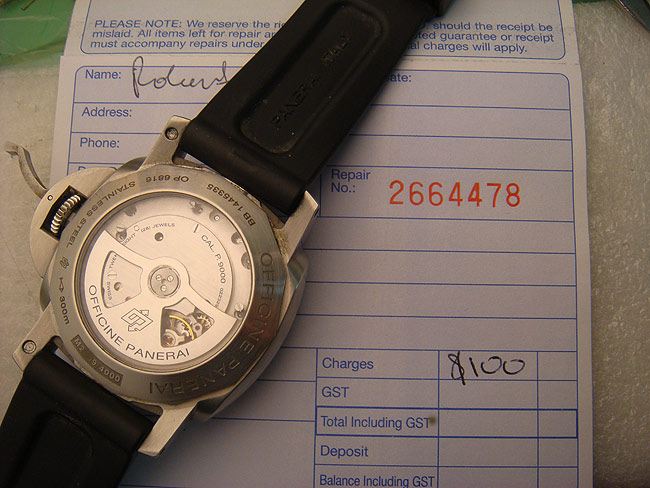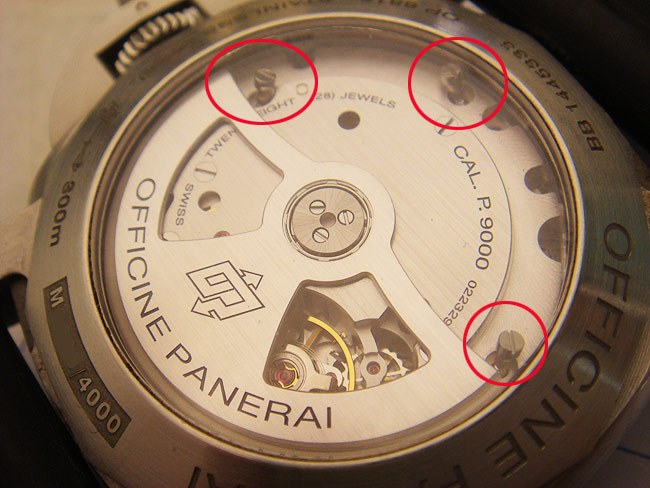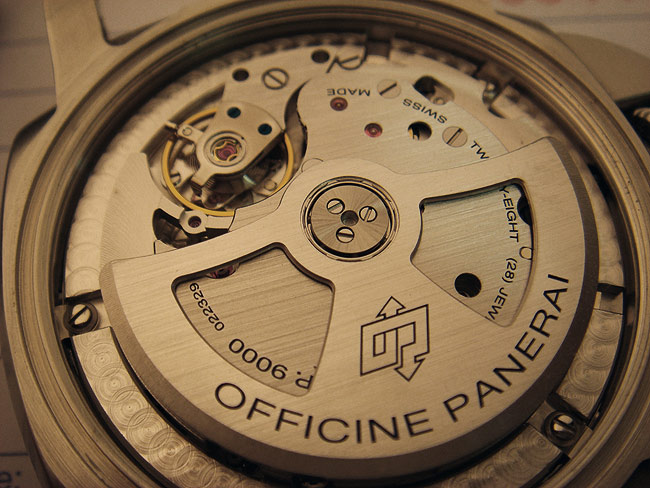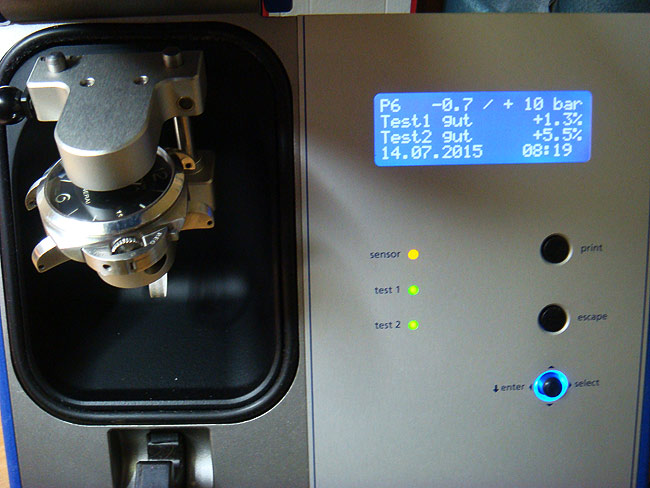If I were to print all the replies I received to yesterday's post then today's newsletter would be 70 pages long. The bottom line is, we are all on the same page on the issue of spare parts.
Let me just share with you a couple more details which will illustrate the points I wish to make. Please be patient with me because this post is not as much about my business as it is about yours.
My last job yesterday was a repair to a Panerai which belongs to Rob. Rob is about my age, a polite gentleman and my customer. The watch is worth around $7000. The problem: all 3 screws which hold the automatic winding unit came loose which prevented the watch from being wound.
Since this particular watch comes with a see through case back and since Rob is an intelligent and curious person, he was actually able to diagnose the problem himself. While he wasn't really sure what steps are required to rectify the problem, I am very much convinced that he was expecting the repair to be a simple one, and that it shouldn't take long to fix it. Which was exactly the case: I quickly explained what I would do, and if the were no surprises, Rob could have his Panerai ready for collection by tomorrow. I also quoted him $100.
Of course I could easily charge him twice that amount, and I am sure he would be equally happy, but that would be both disrespectful and unnecessary because I can fix his watch in less than 15 minutes.
So as predicted the repair was straight forward: after removing the strap and unscrewing the case back with the help of a special tool, all 3 screws were tightened and the rotor was working fine. I also refreshed the case seal, checked the watch for timekeeping and gave it a water pressure test.
Now allow me to pause here for a moment by asking you who is the winner in this case?
Obviously, Rob is over the moon: he got his watch back quickly and cheaply. He is also happy because he knows that if anything ever goes wrong with his Panerai, I am the one who can help him. He feels respected and appreciated.
The other clear winner is the tax office. Out of $100, the tax office is getting an easy $10 in GST. Also, my company profit is taxed at a rate of 30%, PLUS there will be more money going their way once my wages are taxed as well. I guess this is a total of $40 give or take. Not really a bad deal taking into consideration that the Government invested precisely $0 in my education or business.
The third winner is me. Even after paying taxes, I still made a handsome profit for something that was a relatively easy job. Also, I now have Rob as a repeat customer who will spend more money with me in yeas to come, so the value of my business has gone up.
The fourth winner is probably least obvious: it is the Panerai Corporation.
Not only have I restored Rob's watch but I have restored his TRUST in Panerai products. After all, he is a happy PANERAI OWNER and most likely he will buy another watch from Panerai or recommend it to his friends.
Now, Panerai gets this benefit without investing any money into my service or my reputation, yet I am investing all my skills, expertise and reputation into Panerai. Hardly a fair deal as far as I'm concerned.
However - and this is my punch line - the only reason why this fine balance of trust, expertise and respect exists is this: I was able to fix Rob's watch because I actually didn't need any spare parts.
If for example that Panerai needed a new gasket, which is a petty $1 rubber seal, I would not be able to help him at all. If I needed just a simple screw which costs 1cent to make, the outcome would be FAILURE. So by restricting the availability of the supply of spare parts to me, Panerai has full control over Rob, myself and the tax office. Restriction is easy to implement and long-standing and powerful in action.
Now, if you are new to watches, you may ask: but WHY would Panerai or Rolex or any other Swiss brand want an independent Australian watchmaker out of the picture, and ultimately, out of business?
The reason is simple: an independent watchmaker is an extreme pain in the bum for a brand and extremely powerful competitor. I can do my job faster, cheaper and better. I can work on variety of brands so I can provide my customer with much more objective insight. As a mature and far more versatile watchmaker and I personally take pride in my workmanship which ultimately leads to a personal relationship with customers and better repair results.
If Rob took his Swiss watch to a Swiss brand's service centre, his experience and overall satisfaction could have been very different. For big brands, there is no such thing as small repair. 'Quick and cheap fix' does not exist because they don't offer partial repairs. In most cases, additional and unrequested repairs are bundled in so the repair bill is commonly in the vicinity of $1000 or more.
The turnaround time is months! A three to four month wait is common. And these are not my words but yours- often, they will treat you as though you are a complete idiot, someone who will be grateful for being allowed to wear their fine timepiece.
The ultimate outcome: your dissatisfaction with the brand which will never be restored. So the ultimate loser are the brands themselves who in their myopic greed are killing it for everyone.
And here is my second and final punch line: the monopoly on the supply of spare parts is allowed to continue because the Australian Competition and Consumers Commission is incapable of assessing this simple matter adequately. For years, the ACCC's approach to this matter has been pathetic and incompetent: when you, or I, or a group of watchmakers submits a case, the ACCC goes to the brands and simply asks them: are you restricting supply of spare parts? The answer is "No, we are not, we have selected a few independent retailers who have access to our parts". And in cases where the ban is total - which is now the case with almost all Swiss brands- the response is: "the independent watchmakers are not capable of repairing our watches so we are actually doing a big favour to our customers by cutting them out"! And in every case, the ACCC finds this infantile reply - a complete lie- valid enough to close the investigation.
The question the ACCC should be asking the brands is this: how do you actually know that independent Australian Watchmakers are not capable of providing a service to your brand standard, when you have never assessed any of them?
Where is it stated, in black and white, what the requirements to get accredited are? Do you provide any training to independent Watchmakers? If a Watchmaker wishes to invest in tools and equipment, to setup a workshop, and if he passes your test, would you then unconditionally allow access to spare parts? What are the financial commitments that you would expect an independent watchmaker to undertake to meet your brands expectations? Are you pleased to recommend an independent authorized service to your customers?
Personally, I have been told that even if the ACCC ever breaks the monopoly of Swiss brands that I will never get access to spare parts. My sins are beyond redemption.
I have been told by the most well known brand that even if I send my son, who would be then fourth generation watchmaker to Swiss watch school (3+3 years, then a training with specific brand, all at my cost) that even my son will never have access to spare parts. "Never, ever" were the exact words.
Which is fine, and I can live with that. But if that is the case, why are those Swiss brands lying to you? Telling you that we are incompetent when true reason for the restriction is a pure commercial greed?
And why should I continue to prostitute myself by sourcing the watch parts from indirect sources, paying ridiculous amounts of money for a screw, spring or wheel - just to do the 'right thing'?
Make no mistake: the ban on original spares will result in ever increasing number of inferior aftermarket parts. Both small and reputable watchmakers already use those parts exposing themselves to both legal action and customers dissatisfaction. Their customers are not happy, and brands, rightly can finally say: "Well, we told you that independent watchmakers are shonky and not to be trusted".
I for one am out. I am not going to be part of this silly game, trying to juggle my loyalty to customers, love for fine mechanical watches, endless abuse by Swiss brands and the impotent and incompetent ACCC.
I am not going to tell you what to do, what to collect or where to fix your watches, or to write to ACCC, but for the time being, taking your watch to brand service centres is the only option. There is no second choice, second opinion, second quote or second option. You will be charged top dollar so you better like it and enjoy it.
(Although I just interrupted this email for a quick fix of a broken Rolex bracelet, for a lady who lives in country; I actually fixed the bracelet so quickly that she didn't even have time to ask me 'do I owe you something for it?' which is clearly not her fault. Sorry tax office!)
Our government must focus on the most obvious thing: making YOU happy by giving you the opportunity to exercise your consumer rights, of which the fundamental one is the right to a second opinion. Where brute market forces will always prevail, it is government's role to provide at lease some degree of competition because we know that big corporations are very good at abusing the power of monopoly. Don't crush us, don't cut us out: instead, train us, equip us, supply us with whatever we need to show you what we are capable of - and then watch us work for you and your customers.
The only permanent solution is one of mutual respect between brands, watchmakers, government's regulators and watch owners. We are all 'into it'. We owe it to each other.
And we owe it to the next generation of young bright people who one day will look back at the past and ask themselves: why they couldn't fix it before it all fell apart?




No comments:
Post a Comment